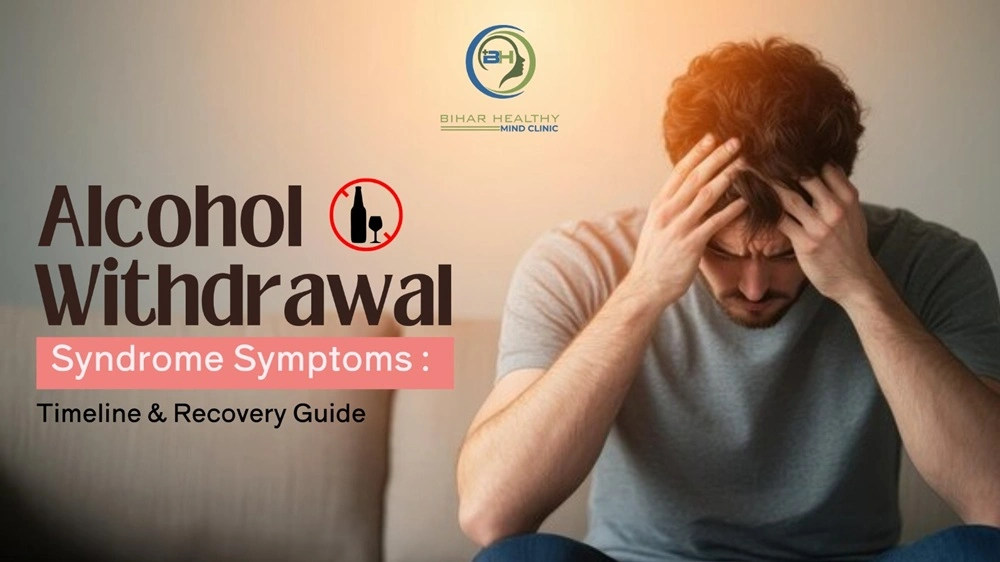
Alcohol use disorder is a serious condition that often goes unnoticed until dependence sets in. For many individuals, stopping alcohol suddenly can trigger uncomfortable and sometimes life-threatening responses known as alcohol withdrawal syndrome symptoms. These symptoms do not appear randomly; they usually follow a predictable timeline. Understanding when alcohol withdrawal begins, how long it lasts, and what treatment options exist can help individuals and families prepare for safe recovery. At Patna Psychiatry, under the care of Dr. Saurabh Kumar, MD (Psychiatry), patients receive specialized guidance to manage withdrawal safely and effectively.
What is Alcohol Withdrawal?
Alcohol withdrawal occurs when a person who has been drinking heavily for a prolonged period suddenly reduces or stops alcohol consumption. The brain and body, accustomed to the presence of alcohol, struggle to adapt, leading to various withdrawal syndrome symptoms. These symptoms range from mild anxiety to severe medical emergencies like seizures or delirium tremens.
-
The severity depends on factors such as:
- Duration and quantity of alcohol consumption
- Overall health condition
- Presence of psychiatric or medical comorbidities
- Past history of alcohol withdrawal
Why Do Alcohol Withdrawal Syndrome Symptoms Occur?
Alcohol acts as a depressant, slowing down brain activity by enhancing the effects of gamma-aminobutyric acid (GABA), a calming neurotransmitter. Over time, the brain compensates by reducing GABA activity and increasing excitatory signals. When alcohol is suddenly removed, this imbalance causes hyperactivity in the brain and nervous system. The result is a range of alcohol withdrawal syndrome symptoms that may become progressively severe without medical intervention.
Alcohol Withdrawal Timeline Explained
Stage 1: 6-12 Hours After Last Drink
The first signs of alcohol withdrawal syndrome usually appear within 6 to 12 hours. These early withdrawal syndrome symptoms include:
- Tremors (shakiness)
- Anxiety and restlessness
- Sweating
- Nausea and vomiting
- Difficulty sleeping
Although these may feel uncomfortable, they are generally not life-threatening. However, they are clear indicators that the body is struggling to adjust.
Stage 2: 12-24 Hours
As time progresses, symptoms intensify. Individuals may begin experiencing:
- Headaches
- Increased blood pressure and heart rate
- Irritability
- Mild hallucinations (hearing or seeing things that are not there)
At this point, medical evaluation is recommended, as the risk of complications starts to increase.
Stage 3: 24-48 Hours
This is often the most critical period. Moderate to severe symptoms may include:
- Seizures
- Severe sweating
- Confusion and disorientation
- Intense cravings for alcohol
Seizures are one of the most dangerous alcohol withdrawal syndrome symptoms. Emergency medical attention is essential if seizures occur.
Stage 4: 48-72 Hours (Delirium Tremens)
The most severe complication, known as delirium tremens (DTs), can develop within 48 to 72 hours after the last drink. Symptoms include:
- Severe confusion and agitation
- High fever
- Intense hallucinations
- Rapid heart rate and high blood pressure
- Risk of death if untreated
Not all individuals experience DTs, but those with a long history of alcohol dependence are at higher risk. Prompt hospitalization is necessary to prevent life-threatening outcomes.
Stage 5: After 72 Hours
Symptoms gradually start to decline after the third day. Still, certain people may continue to face extended withdrawal symptoms, including:
- Anxiety
- Depression
- Sleep disturbances
- Low energy
This phase, known as Post-Acute Withdrawal Syndrome (PAWS), may last weeks or months, requiring ongoing psychiatric care and therapy.
Treatment for Alcohol Withdrawal
Managing alcohol withdrawal syndrome safely requires professional support. At Patna Psychiatry, treatment involves:
-
Medical Detoxification
- Use of medications to reduce anxiety, seizures, and hallucinations.
- Monitoring vital signs to prevent complications.
-
Psychiatric Evaluation
- Assessment of co-existing mental health conditions.
- Addressing emotional symptoms that may trigger relapse.
-
Therapeutic Interventions
- Cognitive-behavioral therapy (CBT) for coping skills.
- Counseling for individuals and families.
-
Long-Term Recovery Plans
- Relapse prevention strategies.
- Support groups and lifestyle modifications.
Importance of Professional Support
Attempting to stop alcohol abruptly at home can be dangerous. Severe alcohol withdrawal syndrome symptoms like seizures and delirium tremens require immediate medical attention. With proper psychiatric guidance, recovery becomes safer and more sustainable.
If you or your loved one is struggling with alcohol withdrawal, reaching out to the best psychiatrist in Patna can make a life-saving difference. At Patna Psychiatry, Dr. Saurabh Kumar provides personalized treatment plans tailored to each patient’s needs.
Final Thoughts
Alcohol withdrawal is a challenging but manageable condition when approached with professional care. Recognizing the timeline of withdrawal syndrome symptoms is the first step toward ensuring safety and recovery. At Patna Psychiatry, patients benefit from a blend of medical expertise and compassionate support, helping them achieve a healthier, alcohol-free life.
Visitors: 79





No comments yet.